What Are The Top Travel Data Sources Scraped By Leading Travel Brands?
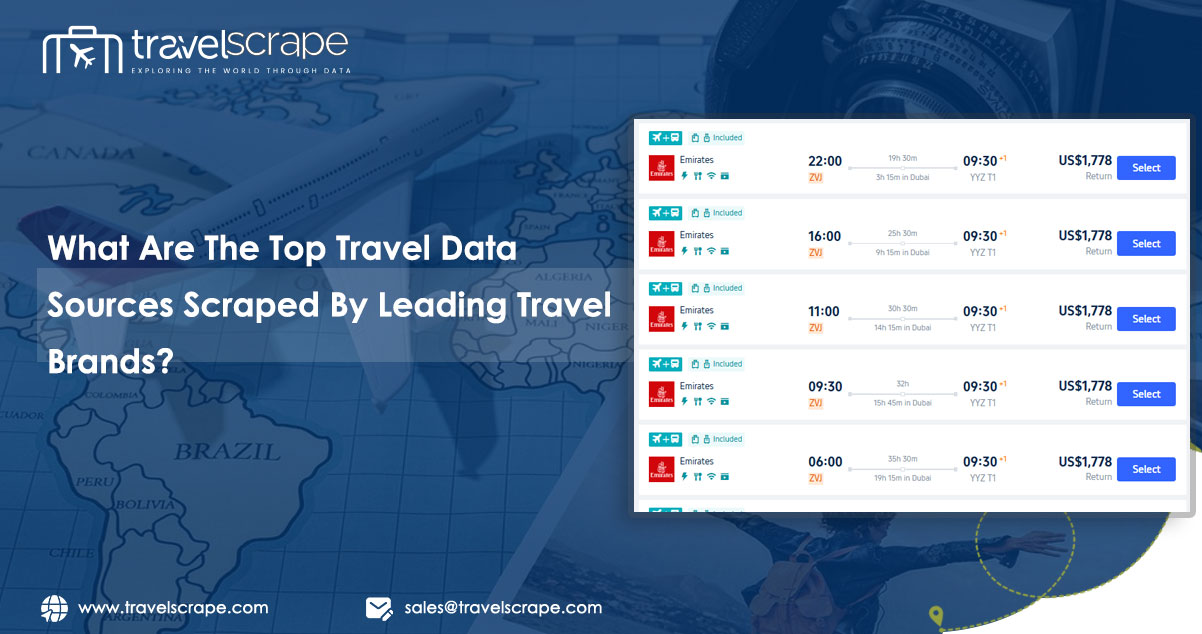
Introduction
In the fast-evolving travel sector, access to precise, detailed, and up-to-date data has shifted from a competitive edge to a critical necessity. To stay ahead, leading travel brands leverage data to refine pricing strategies, improve customer experiences, and fuel overall growth. As a result, web scraping and data extraction technologies have become essential tools within the industry.
The travel ecosystem is brimming with high-value data sources that offer insights into various aspects, including pricing trends, availability, customer preferences, and competitor activities. These Top Travel Data Sources have become indispensable for airlines, hotels, online travel agencies (OTAs), and other key players, playing a pivotal role in guiding strategic decisions.
This in-depth guide will highlight the most valuable data sources actively scraped by industry leaders and the technologies that power them. We’ll explore how this data is reshaping the travel landscape, address the challenges and ethical considerations associated with it, and provide best practices for effectively utilizing Travel Market Data Sources.
Why is Data Scraping Crucial in the Travel Industry?
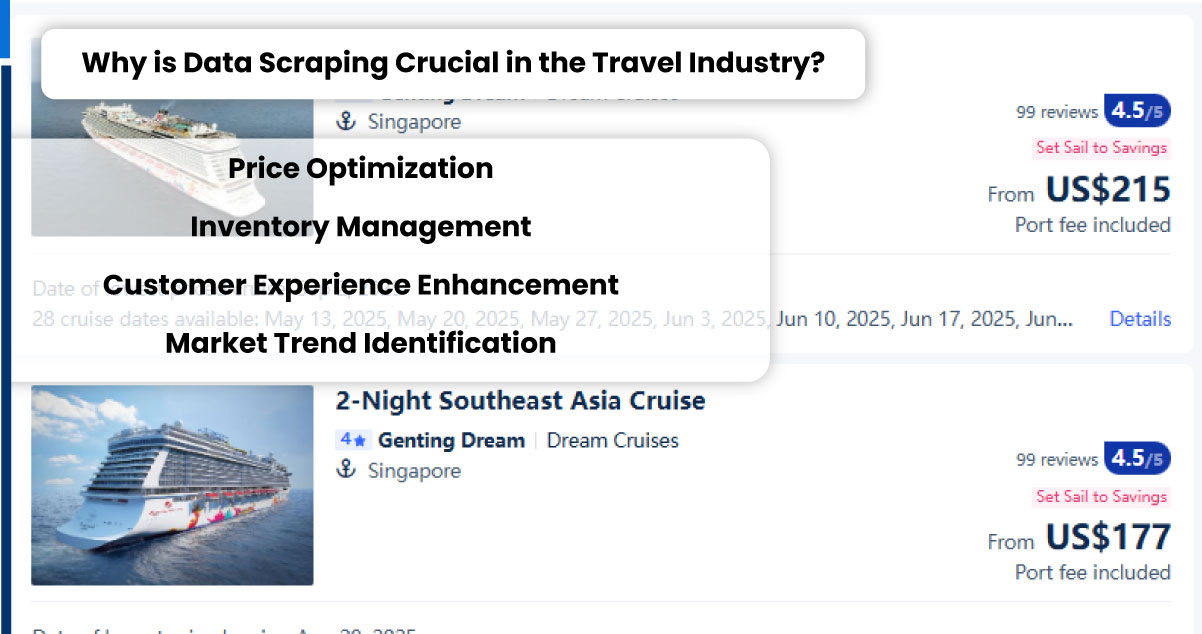
Understanding the significance of Travel Market Data Sources is key before delving into specific data types. The travel industry is known for its unpredictable nature, where prices and availability fluctuate rapidly. Gaining access to real-time insights offers numerous strategic advantages:
- Price Optimization: Businesses can swiftly adapt their pricing strategies in response to competitors' moves, ensuring they remain competitive in a fast-paced market.
- Inventory Management: By analyzing patterns in demand, companies can make more accurate forecasts, leading to more intelligent inventory allocation and reducing overstock or stockouts.
- Customer Experience Enhancement: Gaining insights into traveler preferences allows businesses to tailor their offerings more precisely, creating a more engaging and relevant customer experience.
- Market Trend Identification: Timely identification of shifts in travel trends helps companies adjust their strategies proactively, staying ahead of evolving consumer desires.
The role of OTA Data Scraping has transitioned from a specialized technical task to a critical business intelligence tool. In today’s fast-paced market, leveraging this resource is essential for maintaining a competitive edge.
Key Online Travel Agencies (OTAs) as Data Sources
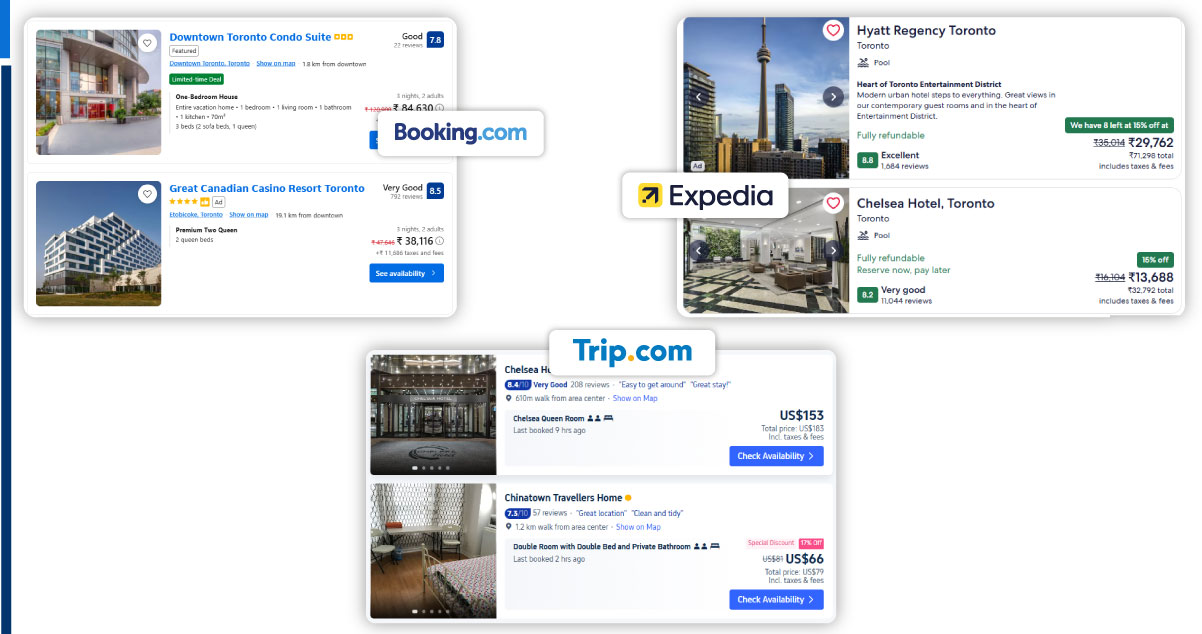
Online Travel Agencies (OTAs) are some of the most valuable Top Travel Data Sources for travel brands. These platforms consolidate an immense volume of data on various aspects such as pricing, availability, and consumer behavior, offering rich insights across multiple service providers.
1. Booking.com
As one of the largest accommodation booking platforms globally, Booking.com provides critical data that helps travel brands with strategic decision-making, including:
- Comprehensive property listings featuring detailed amenities
- Dynamic pricing models varying by dates and seasons
- Popularity indicators include “X people are looking at this property right now.”
- Guest reviews and property ratings
- Promotion and discount patterns
Travel brands actively utilize Hotel Price Data Extraction from Booking.com to gain a competitive edge, analyze market pricing strategies, and identify potential differentiation opportunities within the hospitality industry.
2. Expedia Group
The Expedia Group encompasses many brands, including Hotels.com, Vrbo, and Travelocity. Data from the Expedia ecosystem offers valuable insights into:
- Construction of package deals and bundling strategies
- Cross-selling tactics across different travel services
- Seasonal promotion patterns and trends
- Pricing variations by region and market
- Differences in booking behavior between mobile and desktop platforms
Sophisticated Real-Time Travel Data Scraping from Expedia enables travel brands to understand better how travel components are bundled and marketed to consumers, helping them refine their offerings to meet market demand.
3. Trip.com
As a dominant player in the Asian market, Trip.com delivers valuable insights into:
- Key international travel corridors and trends
- Cultural preferences influencing travel accommodation choices
- Location-specific pricing strategies that drive consumer demand
- Emerging travel destinations within high-growth markets
- Alternative accommodation options gaining traction among travelers
Companies specializing in Travel Aggregator Data Extraction often monitor Trip.com closely to gather insights into the rapidly expanding Asian travel market and track trends in cross-border travel, helping them anticipate shifts in global travel behavior.
Airline-Specific Data Sources
Airline-Specific Data Sources
1. Major Airline Websites
Direct airline websites such as American Airlines, Emirates, Lufthansa, and Singapore Airlines serve as crucial sources of data, offering valuable information including:
- Base fare structures
- Ancillary service pricing
- Loyalty program incentives
- Route network expansions
- Seasonal capacity adjustments
Travel brands closely monitor these Dynamic Travel Pricing Data points to decipher airline revenue management strategies and pinpoint potential arbitrage opportunities.
2. Global Distribution Systems (GDS)
Platforms like Sabre, Amadeus, and Travelport act as centralized reservation systems for airlines globally, providing structured data on:
- Real-time seat availability
- Fare rules and restrictions
- Codeshare arrangements
- Interline agreements
- Commission structures
These comprehensive systems are recognized as some of the most valuable Travel Market Data Sources for organizations seeking to understand airline inventory management strategies and global distribution practices.
3. Flight Aggregators
Flight aggregators such as Skyscanner, Kayak, and Google Flights collect and display flight options from hundreds of airlines, offering insights into:
- Price comparison presentation methods
- Flight search patterns
- Filter usage (direct flights, preferred airlines, etc.)
- Fare volatility over time
- Mobile booking behavior
Scraping Travel Booking Sites like these allow brands to understand better how consumers navigate the diverse and competitive flight booking landscape.
Hotel and Accommodation Data Sources
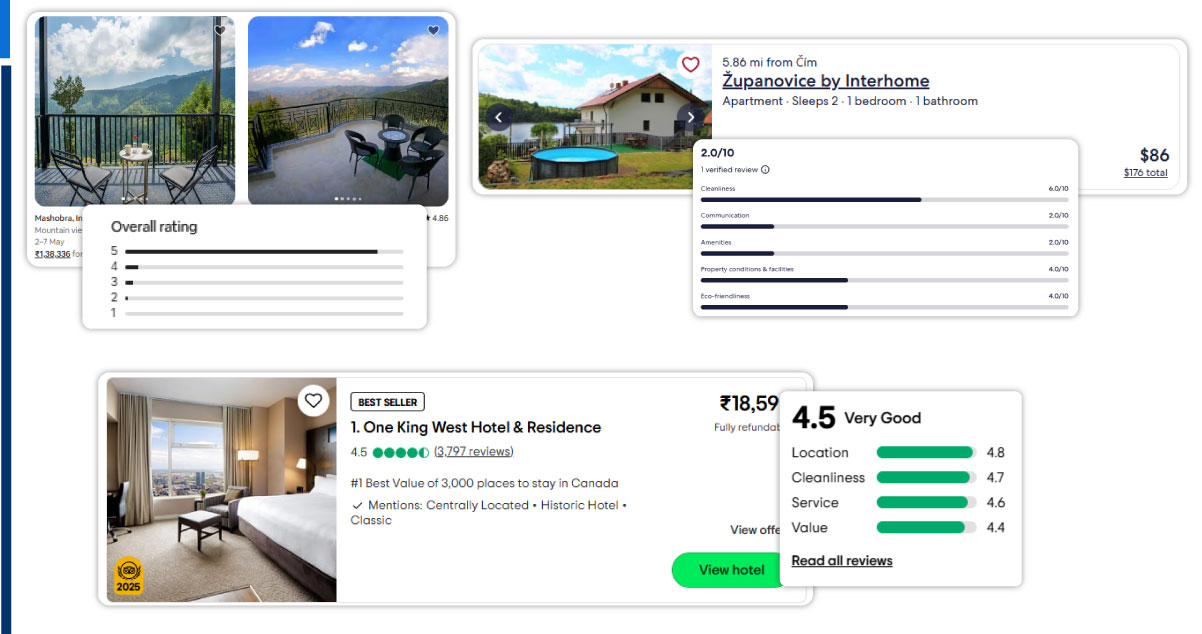
The accommodation industry operates in a complex data landscape, with Hotel Price Data Extraction as a critical source of competitive insights. Understanding how different players in the market adjust their pricing, offers, and promotions is essential for businesses aiming to stay ahead of the competition.
1. Direct Hotel Websites
Leading hotel chains such as Marriott, Hilton, and Accor run advanced direct booking platforms that offer a wealth of valuable data, including:
- Member-only rates
- Loyalty program perks
- Upselling strategies for various room categories
- Dynamic pricing based on length of stay
- Influence of cancellation policies on pricing strategies
Travel intelligence companies closely track these sources to gain insights into how hotel brands strive to increase direct bookings and mitigate the growing influence of online travel agencies (OTAs).
2. Alternative Accommodation Platforms
The increasing popularity of alternative accommodation options has introduced new and vital data sources for tracking consumer behavior and market shifts:
- Airbnb: Offers insights into private accommodation pricing, popular amenities, and emerging neighborhood trends.
- Vrbo: Provides data on family-oriented vacation rentals and seasonal variations in destination demand.
- Sonder and Selina: Showcase innovative hospitality models that combine hotel-style services with apartment-like living spaces.
Through Travel Data Intelligence from these platforms, brands can better understand the changing preferences of travelers seeking non-traditional lodging and adapt their offerings accordingly.
3. Hotel Review Platforms
Online hotel review sites are treasure troves of qualitative data that offer deep insights into customer experiences:
- TripAdvisor: Provides comprehensive guest reviews, property rankings, and insights into traveler preferences.
- Trustpilot: Offers data on customer service ratings for various travel and hospitality brands.
- Google Reviews: Reveals location-based satisfaction metrics and how hotels manage guest feedback and service responses.
By extracting Travel Review Data Intelligence, businesses can clearly understand customer satisfaction drivers and identify areas where service improvements may be needed. This data empowers brands to enhance their offerings and stay competitive in the ever-evolving hospitality sector.
Technical Approaches to Travel Data Collection
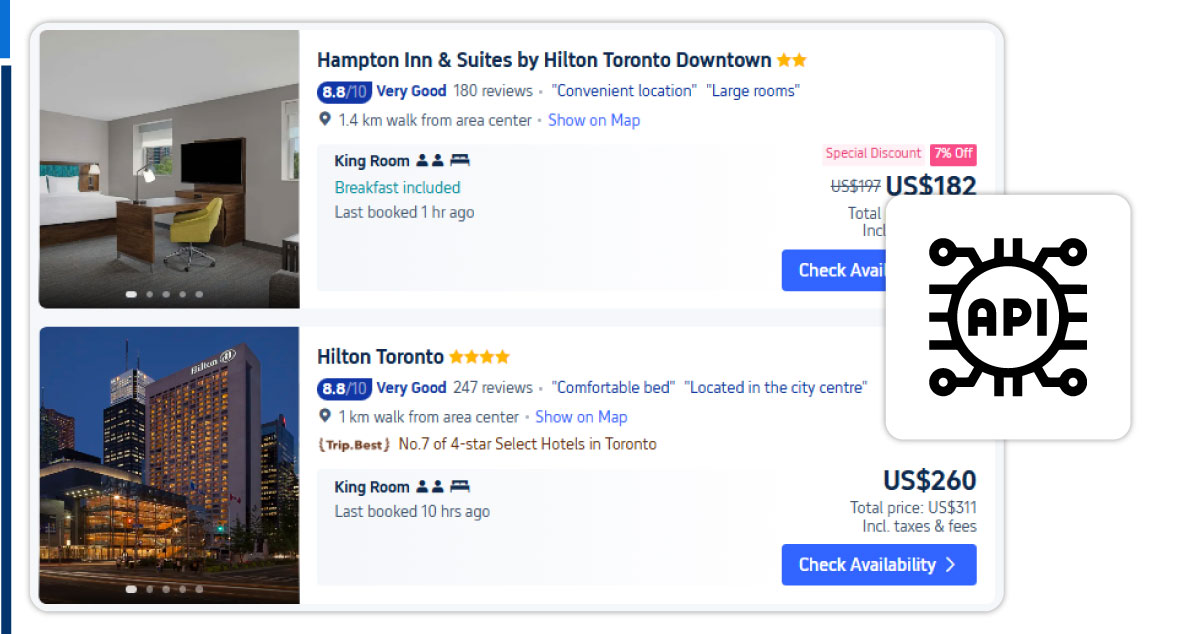
In recent years, the strategies for accessing and collecting travel data have advanced dramatically, driven by new technologies and increased demand for real-time insights.
1. API Integration vs. Web Scraping
Travel brands generally rely on two primary methods to gather data:
- API Integration: This method utilizes officially provided, structured data access directly from the source. It's reliable and generally compliant with data provider terms.
- Web Scraping: This technique automates data extraction from websites without formal API, allowing businesses to gather valuable insights from various online platforms.
The selection of Travel Website Scraping Tools is influenced by data accessibility, how frequently data needs to be updated, and any relevant legal restrictions surrounding the data's use.
2. Real-Time vs. Batch Processing
Different business objectives require different approaches to data collection:
- Real-time Processing: Crucial for applications like competitive pricing strategies and managing limited inventory, where instant updates are vital.
- Batch Processing: More suited for strategic purposes, such as trend analysis or long-term planning, where updates on a less frequent schedule suffice.
The deployment of Real-Time Travel Data Scraping demands advanced technological infrastructure, but it enables instant reactions to shift market conditions, ensuring companies stay ahead of the competition.
3. Data Quality and Normalization Challenges
One of the key obstacles in travel data collection is ensuring data consistency across diverse sources. Common issues include:
- Format discrepancies
- Missing or incomplete values
- Duplicate listings
- Currency and measurement unit conversions
- Variations in naming conventions
To address these challenges, modern Travel Data Intelligence systems incorporate machine learning techniques to resolve these inconsistencies, normalize the data, and create comprehensive, unified datasets that enhance decision-making processes.
Ethical and Legal Considerations
Understanding the legal landscape is crucial when collecting data in the travel industry. Adhering to ethical standards and legal requirements ensures responsible data practices while unlocking valuable insights.
-
Terms of Service Compliance:
Many travel websites outline terms of service that govern data scraping activities, including rate-limiting compliance, robot.txt directives, API usage policies, copyright considerations, and competitive access restrictions. Reputable Custom Travel Data Solutions providers ensure their data collection practices respect these terms while still delivering valuable insights to clients.
-
Data Privacy Regulations:
As global data privacy regulations evolve, travel brands must navigate frameworks like GDPR in Europe, CCPA in California, and other regional data protection laws. Businesses must ensure that their data collection partners comply with these regulations, particularly when personal information is involved.
-
Industry Standards and Best Practices:
Emerging standards and best practices guide responsible data collection in the travel industry. Key practices include identifying scraping bots, ensuring transparent attribution of data sources, maintaining reasonable access frequency, considering server load, and adhering to data minimization principles. These standards are vital for the sustainability and fairness of the travel data ecosystem.
How Travel Scrape Can Help You?
We recognize the challenges of navigating the expansive world of Top Travel Data Sources. Our team of data experts has crafted bespoke solutions tailored to the specific needs of travel industry professionals who want to gain a competitive edge.
Our comprehensive services include:
- Custom Data Collection: Tailored scraping solutions that capture the precise data points your business requires.
- Legal Compliance Assurance: All our data-gathering methods comply with legal standards and industry best practices.
- Data Normalization: We convert raw data into structured, actionable insights seamlessly integrating with your existing systems.
- Real-Time Monitoring: Our advanced infrastructure enables continuous tracking of price shifts and inventory changes.
- Competitive Intelligence Dashboards: Intuitive visualization tools that make your data insights easy to access and understand across your team.
- Strategic Implementation Support: Professional advice on utilizing data insights to drive impactful business decisions.
Whether you're looking to refine your pricing strategy, explore untapped market opportunities, or gain deeper insights into consumer behavior, Travel Scrape’s Custom Travel Data Solutions empowers you with the intelligence needed to thrive in today’s ever-evolving travel market.
Conclusion
In the fast-paced travel industry, having access to real-time, comprehensive data is essential for staying ahead. By leveraging Top Travel Data Sources, businesses can optimize pricing, improve customer experiences, and spot emerging market opportunities.
The need for advanced data intelligence will grow as Travel Aggregators continue to reshape the market. Companies investing in robust Travel Industry Web Scraping solutions can make informed decisions and adapt swiftly to market shifts.
Ready to elevate your travel business with actionable insights? Reach out to Travel Scrape today and explore how our specialized travel data solutions can help you thrive in today’s dynamic travel marketplace.